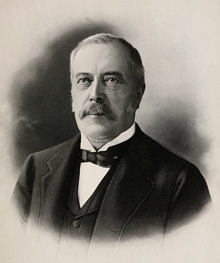
Back ويليام وايتنغ الثاني Arabic ويليام وايتينج اى ARZ ویلیام ویتینق ایی AZB William Whiting (Politiker, 1841) German
William Whiting | |
|---|---|
 | |
| Member of the U.S. House of Representatives from Massachusetts's 11th[1] district | |
| In office March 4, 1883 – March 3, 1889 | |
| Preceded by | George D. Robinson |
| Succeeded by | Rodney Wallace |
| 3rd Mayor of the City of Holyoke, Massachusetts | |
| In office 1878–1879 | |
| Preceded by | Roswell P. Crafts[2] |
| Succeeded by | William Ruddy[2] |
| 2nd Treasurer of the City of Holyoke, Massachusetts | |
| In office 1876–1877 | |
| Preceded by | Charles W. Ranlet[2] |
| Succeeded by | Charles W. Ranlet[2] |
| Massachusetts State Senate | |
| In office 1873–1874 | |
| School Committee of the Town of Holyoke, Massachusetts | |
| In office 1868[3]–1868[3] | |
| Personal details | |
| Born | May 24, 1841 Dudley, Massachusetts |
| Died | January 9, 1911 (aged 69) Holyoke, Massachusetts |
| Resting place | Forestdale Cemetery Holyoke, Massachusetts |
| Political party | Republican |
| Spouse | Anna Fairfield Whiting[4] |
| Children | William Fairfield Whiting, Samuel Raynor Whiting[5] |
| Residence(s) | Holyoke, Massachusetts |
| Alma mater | Amherst College |
| Occupation | Paper Maker |
| Signature | |
William Whiting (May 24, 1841 – January 9, 1911) was an American businessman and politician from Holyoke, Massachusetts. Whiting descended from an English family who first settled in Lynn, Massachusetts, during 1636.[4]
Whiting was born in Dudley, Massachusetts, May 24, 1841. Whiting attended public schools and graduated from Amherst College.[4]
Whiting worked for the Holyoke Paper Company and the Hampden Paper Company. At the age of 17 Whiting started at the Holyoke Paper Company working first as a bookkeeper. After three years working as a clerk, Whiting became a salesman first working out of the company's main office and later working as a commercial traveling salesman.[6] Whiting organized the Whiting Paper Company in Holyoke, Massachusetts, in 1865.[7] In 1865, Whiting built his first mill followed by another in 1872.[7] When the Whiting Paper Company was first formed. L.L. Brown of South Adams, Massachusetts, was president and Whiting was agent and treasurer. Whiting later became president and his son, William Fairfield Whiting, became treasurer.[7] Whiting later organized the Collins Paper Company and built a paper mill in North Wilbraham, Massachusetts.[7]
In addition to his political and manufacturing careers, Whiting was a prominent philanthropist in Holyoke's history, and endowed the city with many of its secular institutions. In 1870 along with John and Edwin Chase, Whiting incorporated the Holyoke Public Library, serving as its first president.[8] During his mayoralty Whiting privately funded the construction of the Holyoke Opera House, a venue which once hosted a wide variety of renowned Vaudeville and musical acts, as well as early motion pictures. In 1893 he led the efforts to found the Holyoke Medical Center, then known as Holyoke City Hospital, as the first non-sectarian medical institution in the city.[9] Being a member of the Mount Tom Lodge of freemasons, his work in philanthropy was held in such regard that he would go on to have the city's second lodge named after him in 1909, an unusual honor as freemasons rarely name lodges after living persons. Following a period of declining membership and poor bookkeeping the William Whiting Lodge however had its charter suspended in 1997.[10]
- ^ Poore, Ben: Perley (1884), Official Congressional Directory, Washington, D.C.: United States Congress, p. 42
- ^ a b c d Copeland, p. 17
- ^ a b Copeland, p. 39
- ^ a b c Clark, p. 155
- ^ Clark, pp. 155-156
- ^ White, James Terry (1910), The National Cyclopaedia of American Biography: Being the History of the United States as Illustrated in the Lives of the Founders, Builders, and Defenders of the Republic, and of the Men and Women who are Doing the Work and Moulding the Thought of the Present Time. Supplement 1, New York, N.Y.: J.T. White and Co., p. 481
- ^ a b c d Weeks, Lyman Horace (1916), A history of paper-manufacturing in the United States, 1690-1916, New York, N.Y.: The Lockwood Trade Journal Company, p. 247
- ^ "Holyoke". History of the Connecticut Valley in Massachusetts, with illustrations and biographical sketches of some of its prominent men and pioneers. Vol. II. Philadelphia: Louis H. Everts; Press of J.B. Lippincott and Co. 1879. pp. 915–938. OCLC 866692568.
- ^ "About Us". Holyoke Medical Center. Retrieved June 11, 2018.
- ^ Brooks, Archibald (1950). Mount Tom Lodge A. F. & A. M. 100th Anniversary. Anker Printing Company. p. 10.